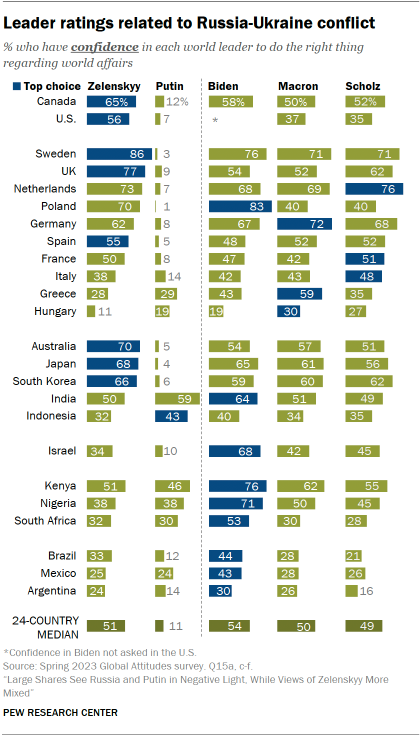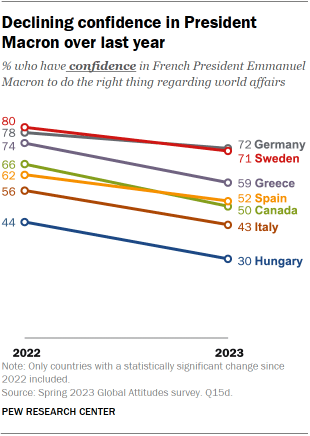
When comparing world leaders associated with the Russia-Ukraine conflict, it is clear there is more confidence in the Ukrainian, American, French and German leaders than the Russian one. In fact, in 17 of the 24 countries surveyed, Zelenskyy or Biden garner the highest confidence ratings across the five leaders tested. These include French President Macron, German Chancellor Scholz and Russian President Putin.
Roughly half or more across these 24 countries see Biden, Zelenskyy, Macron and Scholz in a positive light.
Zelenskyy (also spelled Zelensky) gets his highest comparative ratings from people in Sweden, the UK, Australia, Japan, South Korea and Canada. The Ukrainian president also gets solid ratings in the U.S. and Spain.
Related: Americans confident in Zelenskyy, but have limited familiarity with some other world leaders
Biden gets higher comparative ratings in the African and Latin American countries surveyed as well as in Poland, Israel and India. However, a majority in India also have confidence in Putin. For more on international attitudes toward Biden, see International Views of Biden and U.S. Largely Positive.
Macron gets higher comparative ratings from Germans and Greeks (a consistent pattern over time), while Scholz gets his highest ratings from the Dutch. People in France and Italy also give Scholz relatively high confidence ratings.
Hungarians have little confidence in any of the leaders tested.
Indonesia is the only country where its people have relatively more confidence in Putin than the other leaders tested. Still, only 43% of Indonesians have confidence in his world leadership. And many in Indonesia are not sure or can’t rate the performance of many of the international leaders tested.

Confidence in Macron has fallen significantly over the past year in a handful of NATO countries. The survey was conducted at a time when France was undergoing fierce political divisions over Macron’s efforts to increase the retirement age and voicing his concerns about France getting into a U.S.-China conflict over Taiwan.
Confidence in Macron has fallen 16 percentage points in Canada, from 66% in 2022 to 50% in 2023. Similar double-digit declines also occurred in Sweden, Greece, Hungary, Italy and Spain. Germany also saw declines in opinion and in Australia and the U.S., while direct comparisons to 2022 data are not possible due to changes in how the questions were asked, confidence also declined significantly since last year.
Attitudes toward Scholz also fell in the second year of his term, especially in Hungary and Canada, where his confidence ratings fell 14 and 13 percentage points, respectively. But the drops were not as consistent or as extensive as those of Macron.
For more on how attitudes toward Biden have changed since last year, see International Views of Biden and U.S. Largely Positive.


